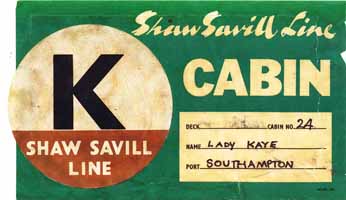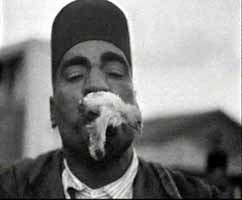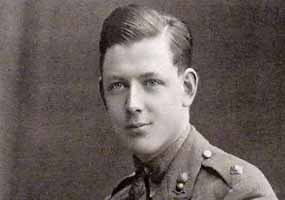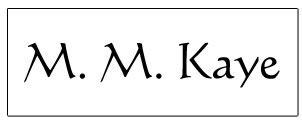Mollie on Television - Echoes of the Raj
Echoes Of the Raj - A Look at British Rule in India (part of the Time Watch series).
Transmitted by BBC2, at 20:05 on 27 May 2000 and repeated on 13 April 2001.
Producer: Catrine Clay;
Editor: Laurence Rees.
.jpg) Every other Thursday in the 1920s and 1930s a P&O ship left London bound for Bombay. On board were all of British India – governors, magistrates, Indian army officers, tea planters and their wives – and they all took cameras. Using these home movies and photographs, five personal stories record a lost way of life, building an evocative picture of the dying days of the Empire.
Every other Thursday in the 1920s and 1930s a P&O ship left London bound for Bombay. On board were all of British India – governors, magistrates, Indian army officers, tea planters and their wives – and they all took cameras. Using these home movies and photographs, five personal stories record a lost way of life, building an evocative picture of the dying days of the Empire.

Lady Kaye's luggage label en route to
Southampton on the Shaw Savill Line.
TRANSCRIPT FROM "ECHOES OF THE RAJ"
[M M Kaye and her sister, Bets first appear 20 minutes into the documentary]
NARRATOR
Happy to be voyaging back in the other direction from England to India were Mollie and Bets Kaye.
.jpg)
Mollie Kaye with her sister, Bets
BETS KAYE
We hated England. We always wanted to get back to India because it’s such a lovely place. Oh dear, how thrilled we were to be back.
M M KAYE
Too good to be true. Prayed for a miracle and I got it.
NARRATOR
Mollie and Bets were born in Simla where their father was chief cipher expert during the first world war. Like most other raj children, they were sent home to school to England and hated it. After the exotic life of India, England was wet and cold and dull. They couldn’t wait to board the P&O liner and head for home.
BETS KAYE
We were always fascinated by the Suez Canal and Port Said. One put a bag on the top of a long thing and it was taken down and you order various things and they put them in the bag and pull it up and they said it cost so much - one argued about that for a bit - but then you’d put the money in the bag and it went down again (laughs). Do you remember Moll?
M M KAYE
Another thing was the gully gully gully men.
BETS KAYE
Oh, the gully, gully, men, yes (laughs)
M M KAYE
Mrs Victoria (laughs)
And they used to produce baby chickens (from out of their mouths) Amazing people and they didn’t change at all.
NARRATOR
In the summer months, the British government of India moved headquarters from Delhi to Simla to avoid the stifling heat. Only two cars were allowed, the viceroy’s and the military Commissioner in chief’s. Everyone else had to come up from the railway station by rickshaw or on foot. Although in the Hymalayas, Simla was pure Surrey. For Mollie and Bets Kaye it was home.
MMK.jpg)
We were born in Simla and you can’t be more Raj than that.
Any place where you’re really happy when you were young… the streets of that place… everything of that place… is home… and always will be.
We knew all the people and shops and things in Simla and naturally when we were there, knew all the children.
We used to shout ruderies at each other and you’d run down the high street and, I may say, the people who pushed our rickshaws were always hotly backing us (laughs).
BETS KAYE
Our chief amusement was stalking monkeys. Because monkeys would come in you see and pinch things.
M M KAYE
I remember one coming out of mother’s bathroom and its face was completely white - and a large powder puff in the other hand (laughs). And Bets, chasing it down the road. We absolutely loved it. Every minute of it.
BETS KAYE
 The boys had to come home (to England) round about the age of six otherwise they’d get spoilt and so Bill (brother) had to be sent home to England and of course, Mum was always in a state about Bill. “My Billum”. Pathetic really, wasn’t it?
The boys had to come home (to England) round about the age of six otherwise they’d get spoilt and so Bill (brother) had to be sent home to England and of course, Mum was always in a state about Bill. “My Billum”. Pathetic really, wasn’t it?
NARRATOR
Their brother Bill was seven, a small boy in a sailor suite when he last saw his father. He didn’t see him again for twelve years. By then each was unrecognisable to the other.
BETS KAYE
.jpg) He didn’t know his father which was very sad. He could only think of his father as the chap who walked about in Simla holding his hand. He (Bill) was a tall man. But you see he (father) was a short man – about the same height as Mum and the first time he met Daddy when he was a grown up, he said to Mum “Who’s that funny little man?” and I’m afraid Pop heard it and it was very very sad. (35 mins)
He didn’t know his father which was very sad. He could only think of his father as the chap who walked about in Simla holding his hand. He (Bill) was a tall man. But you see he (father) was a short man – about the same height as Mum and the first time he met Daddy when he was a grown up, he said to Mum “Who’s that funny little man?” and I’m afraid Pop heard it and it was very very sad. (35 mins)
With regard to India’s Independence in 1947 and its consequences:
BETS KAYE
It was terrible. A train would be stopped and everybody in it was murdered if they were Hindu or, otherwise, if they were Muslim.
M M KAYE
It sent tears running down my cheeks, feeling an awful stinker. It’s deserting. We were deserting when they were really in a nasty mess. They had no food; they had no water; they had no anything. We were leaving. We just walked out. We’d got somewhere to go.
